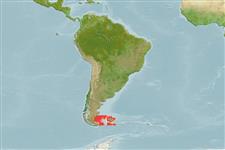Teleostei (teleosts) >
Perciformes/Notothenioidei (Icefishes) >
Nototheniidae (Cod icefishes) > Nototheniinae
Etymology: Patagonotothen: Composed from Patagonia, the Argentinian province + Greek,noton = back + Greek, adverbial particle, then, that denotes distance or removal (Ref. 45335).
Eponymy: Eustace Rolfe Gunther (1902–1940) was a British junior zoologist on the Discovery Oceanographic Expedition (1925–1927) during which he studied the habits of whales and life in the Antarctic and southern oceans. [...] (Ref. 128868), visit book page.
More on author: Norman.
Environment: milieu / climate zone / depth range / distribution range
Ecology
Marine; benthopelagic; depth range 30 - 160 m (Ref. 43705). Temperate; 49°S - 56°S
Southwest Atlantic: Patagonian region of Argentina, around the Falkland Islands, and Burdwood Bank.
Size / Weight / Age
Maturity: Lm ? range ? - ? cm
Max length : 25.0 cm TL male/unsexed; (Ref. 124154)
May be found at depths greater than 250 m in the Patagonian region (Ref. 5179).
Mature females may spawn for the first time from around 3-4 years of age (Ref. 71843).
Dewitt, H.H., P.C. Heemstra and O. Gon, 1990. Nototheniidae. p. 279-331. In O. Gon and P.C. Heemstra (eds.) Fishes of the Southern Ocean. J.L.B. Smith Institute of Ichthyology, Grahamstown, South Africa. (Ref. 5179)
IUCN Red List Status (Ref. 130435: Version 2024-1)
Threat to humans
Harmless
Human uses
Fisheries: commercial
Tools
Special reports
Download XML
Internet sources
Estimates based on models
Preferred temperature (Ref.
123201): 5.4 - 8.3, mean 6.1 °C (based on 22 cells).
Phylogenetic diversity index (Ref.
82804): PD
50 = 0.5001 [Uniqueness, from 0.5 = low to 2.0 = high].
Bayesian length-weight: a=0.00501 (0.00279 - 0.00901), b=3.21 (3.05 - 3.37), in cm total length, based on LWR estimates for this species & (Sub)family-body (Ref.
93245).
Trophic level (Ref.
69278): 3.7 ±0.6 se; based on size and trophs of closest relatives
Generation time: 5.0 ( na - na) years. Estimated as median ln(3)/K based on 1
growth studies.
Resilience (Ref.
120179): Medium, minimum population doubling time 1.4 - 4.4 years (K = 0.22; Fec = 10,000-28,000).
Fishing Vulnerability (Ref.
59153): Low vulnerability (15 of 100).
Nutrients (Ref.
124155): Calcium = 37.3 [24.2, 74.0] mg/100g; Iron = 0.351 [0.222, 0.586] mg/100g; Protein = 17.4 [16.1, 18.7] %; Omega3 = 0.653 [0.339, 1.244] g/100g; Selenium = 12.7 [6.3, 25.2] μg/100g; VitaminA = 48.1 [14.7, 156.9] μg/100g; Zinc = 0.708 [0.520, 0.949] mg/100g (wet weight);
